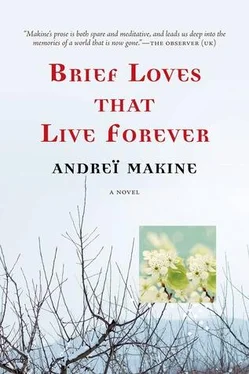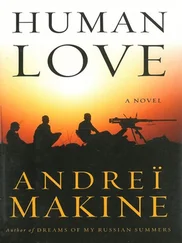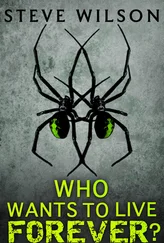After a while our heads begin to spin, it feels as if we are slowly floating along this aromatic corridor that stretches out before us to infinity.
I have never in my life seen such an immense orchard, “ten miles by fourteen,” the young woman I am escorting has informed me. It is already an hour and a half since we entered this realm of blossom so that, if we keep straight on along the central avenue, it will take us another two or three hours to walk the length of this gigantic apple orchard. But, more than its extravagant dimensions, what dazzles me is its beauty. Under a powerful sun, this frothy tide washes over us, dazes us with its fragrances, sets us reeling in the dream every man cherishes, that of finding himself walking upon the clouds’ curvaceous vapors …
There is perfect silence: not one insect, no birds, an unchanging light, the sky deep blue, the immaculate purity of the flower heads, a sweetness hangs in the air. It is paradise!
And yet we are here to demonstrate that all this is a hell. Such is the task undertaken by my friend, a journalist and a passionate dissident, determined to denounce this “model orchard” in a samizdat article as one of the absurd creations of Soviet socialism in decline.
“Look, the whole madness of the communist system is concentrated here. A monstrous orchard with a purely ideological purpose: to create the biggest plantation in the world. A triumph of collectivist agriculture! And that’s not all. Whenever the old crocodiles in the Kremlin drive past from Moscow to Kiev, what they see from their limousines is a continuous spread of white. Because the trees, as you can observe, are planted close together …”
“It’s very pretty …”
“Pretty! Grow up, for goodness sake! You’ve got a mental age of ten: and you’ve had it ever since we were at the orphanage … ‘Pretty’! What you need to know, my poor friend, is that this orchard is completely unproductive. No bee wants to bust its guts flying five miles to reach the center of this crazy plantation. As a result, the flowers are not pollinated and the trees don’t bear fruit. No apples will ever grow in this ideal apple orchard. It’s sterile! Just like the regime we have the misfortune to live under. Now do you get it?”
I have concurred, with my head hunched between my shoulders, like a slightly stupid but eager and willing pupil. My friend has now concluded her exposition.
“Well, it may be pretty. But it’s a beauty that’s perfectly useless.”
I felt tempted to speak up for the wonderful uselessness of beauty, but this argument suddenly seemed devoid of interest. The white ocean we were slowly immersing ourselves in made all critical judgments increasingly beside the point. Of course one could mock the Soviet obsession with size, the will to transform every detail of reality into a propaganda message. And this inevitable slide into absurdity, a tendency typical of totalitarian regimes in the throes of senility. I could hardly fail to agree with my friend’s caustic comments. But the mind was quickly exhausted, as the white tide turned into an intoxication, one’s gaze dilated and offered quite a different way of seeing, of understanding, of situating oneself in relation to the world.
At first my friend had wanted to photograph this example of a “Potemkin village, Soviet style,” as she called it. She took several shots, realized she was defeated.
“You’d have to go to the moon to get the perspective needed for megalomania on this scale!”
She put away her camera and we began walking again, no longer venturing any commentary on the floral torrent as it swept us along in its glorious madness.
Little by little we have lost all track of time and space.
And yet the moment in history when our walk took place, back in the mid-eighties, was particularly significant. The old crocodiles in the Kremlin my friend had referred to were dying one after the other. A young leader, whose name was hardly known as yet, was giving rise to confused hopes. Our disillusioned compatriots had little faith in this. The existing regime seemed to be destined for a pathetic, protracted old age, encroaching on our thirst for freedom, deluging us with lies, provoking ridicule with creations as monstrous as they were absurd. Yes, this apple orchard among them.
The little breeze of change that arose that spring produced an unexpected reaction on the part of intellectuals hostile to the regime: instead of rejoicing at these first signs of the thaw, the dissidents attacked the decrepit regime more virulently than ever and, with redoubled intransigence, demanded immediate and radical liberalization. And it was notable that now everyone declared himself to be a dissident. They were not so common in the years when Shalamov was in the Kolyma gulag …
I did not dare mention the paradox of this tardy militancy to my companion. I was too keen for us to remain friends. First of all, because I had known her since she was a child and was aware that, already in her teens, she was fiercely rebellious, hence her nickname at the orphanage, “Red Riding Hood”: she had moved heaven and earth to get herself a scarlet knitted hat, to thumb her nose at our regulation gray headgear … She had also come to see me a month earlier at the military hospital where I was receiving treatment for burns sustained in a helicopter crash in Afghanistan. I was touched by her visit, being already aware that in this life ties of affection can easily be broken, particularly when one goes off to a war everybody thinks is pointless. In reality, she had not come because she carried a torch for me, nor to indulge in nostalgia for our childhood. Her aim was to publish what I had to say in her samizdat newspaper … But I was a poor storyteller, capable only of echoing her own views: yes, a dirty war, a moribund ideology trying to export itself and sacrificing thousands of young lives in the process … My friend was hoping I would talk to her about the opposition, which, according to her, must necessarily be making itself felt in the regiments. I had disappointed her there too: a soldier becomes a fairly basic creature who simply wants to survive, and for this he finds it convenient not to think too much. “So, no way of resisting?” “Yes, there is. Drink. And drugs …”
When I emerged from the hospital she invited me on this dissident expedition to the model apple orchard. Was she counting on having a little more time to get me to talk about my past as a soldier? Or did she simply prefer to have a man with her on this trip through remote countryside?
Now we advance in silence, through a soft, white, perfectly unmoving dream. No breath of air can penetrate the bloom-laden density of these innumerable trees, no sound: their branches awash with petals do not stir, nor do their shadows along the avenue. I know my friend is there to gather proof of the rank stupidity revealed by such an arboricultural project and yet I can feel she is increasingly disconcerted, her verdict had been reached before our excursion, but she had not foreseen this insane plantation’s magnificent lack of proportion. I glance at her furtively from time to time. She walks with an uncertain tread, looking to the right, to the left, with vaguely distressed incredulity. This white avalanche in which we are drowning is extraordinarily beautiful, it cannot be denied. Beautiful to the point of ecstasy, to the point of swooning, so unbelievably beautiful that, in admiring it, one gradually forgets who one is, even forgetting that at some time one will have to abandon this hazy reverie and return to one’s previous life.
What life? I read this question in my friend’s wide-open eyes. And the avenue unfolds in front of us, still with the same milky brilliance, an unchanging, hypnotic, endless pathway.
Читать дальше









